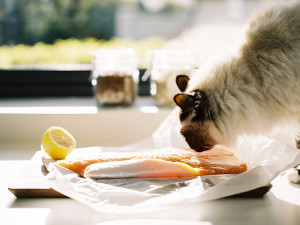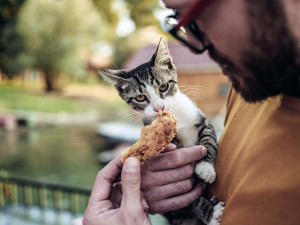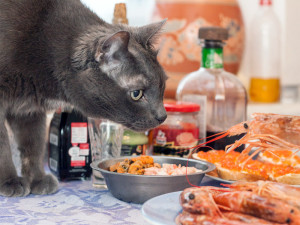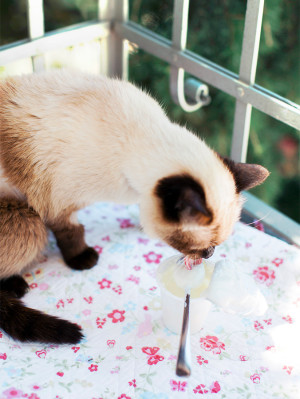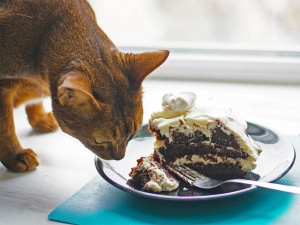Can Cats Eat Raw Meat?
They seem awfully interested in meal prep.

Share Article
Is your kitty sniffing around as you prep the raw chicken or get the bacon ready for the skillet? They really want a taste, and if they had their way, they’d get one. But can they? While some healthy cats may tolerate eating raw meat without getting ill, the risks of feeding raw meat outweigh any potential benefits. Always consult your vet before changing your cat’s diet.
Raw diets, sometimes called BARF diets (which stands for biologically appropriate raw food, not what might happen if you feed one to your cat), have become more popular with pet parents over the past couple of decades. Feeding raw meat to your cat carries the risk of causing problems for your cat, other pets, family, and community. These risks are likely more pronounced for cats who are fed raw food as their primary source of nutrition, but even giving them raw meat as an occasional treat can cause problems.
Is raw meat good for cats?
Pet diets can be a touchy topic. Food is love, so of course strong emotions will be involved in how and what you feed your cat. Cat parents want to do everything possible to keep their kitty happy and healthy for as long as possible, so it’s natural to look for ways to maximize the benefits of their cat’s diet. It’s easy to be swayed by cure-all claims and isolated success stories, but sorting out the facts about feeding raw meat to cats can be complicated.
Proponents of feeding raw meat promote many potential health benefits, including improved coat appearance, resistance to infection, curing or preventing diseases, and improved stool consistency. Studies have failed to show evidence of these purported improvements, except that dogs fed a larger proportion of a raw, meat-based diet as puppies had a decreased risk of ear infections later in life. To date, there are no proven benefits to feeding raw meat to cats.

Can cats eat raw bones?
Raw bones are also promoted as a way to help keep your cat’s teeth clean. Feeding whole bones, whether raw or cooked, is dangerous for cats and especially dangerous for their teeth. Chewing on bones is one of the most common causes of dental fractures. Fractured teeth are incredibly painful and set the stage for deep dental infections involving the tooth root and bones anchoring the teeth.
Raw bones can also cause problems if swallowed. Small and large bones can get caught in the esophagus and require an emergency procedure to remove. If the bone reaches the stomach, the acid in there is strong enough to break down bone, but the gritty bone material will often cause significant irritation as it passes through the intestines. Bone ingestion is also a common cause of constipation, as the dry bone material can turn poop into rock-hard nuggets.
Is raw meat completely safe for cats?
In addition to having no proven benefits, feeding raw meat carries some significant risks for your cat, your other pets, and your family. One of the biggest benefits of cooking meat is that it kills dangerous pathogens like bacteria and parasites. Harmful bacteria like Salmonella, Escherichia coli, Listeria, and Clostridium difficile are commonly found in raw meat and in raw pet diets. While some cats can handle exposure to these pathogens better than humans, other cats can develop a life-threatening illness.
Even if a cat doesn’t get sick from eating contaminated meat, they can harbor harmful bacteria in their intestinal tract. This leads to bacterial shedding that risks infecting others who are more susceptible to illness. This is especially important in households with immunocompromised people or pets, young puppies or kittens, infants, elderly people, or human healthcare workers.
Although feeding raw meat to your healthy cat may not be a big danger to them, it can cause significant problems for others. Because there are no benefits to feeding raw meat, the risk of causing a problem isn’t worth it. Cooking the meat or finding a safer snack for your cat is always the better option.
Nutrition facts: Raw meat for cats
Feeding raw meat to your cat may seem like a more “natural” diet for them, but (again) nutrition is rarely simple. One study at the School of Veterinary Medicine at the University of California Davis evaluated the health effects of feeding cats a diet of ground, raw, whole rabbit. Within ten months, all cats developed a deficiency of taurine, an essential amino acid. Over 70 percent of those cats had changes to their heart function, and one died of heart disease due to this, despite appearing outwardly healthy.
Of course, feeding an occasional bite of raw meat isn’t going to cause serious problems like this, but feeding a homemade raw diet can have long-term effects and is more complicated than it might seem. Finding the right balance of protein, fat, carbohydrates, vitamins, minerals, and amino acids is a challenge. This is not something cat parents should try to tackle on their own or with unvetted online advice. If you’re committed to making a raw diet for your cat despite the risks, consulting with a veterinary nutritionist is vital to your cat’s health. If you’ve decided to feed a commercially produced raw diet, pick a brand that uses high-pressure pasteurization on all their products (to prevent cross-contamination of equipment) and carries a statement of nutritional adequacy from AAFCO (American Association of Feed Control Officers).
Studies show that cooking meat does not significantly impact its macronutrient digestibility or total energy availability for cats. Cooking just makes meat safer for cats to eat.
Other foods that are safe for cats
As much as your cat may want a taste of whatever raw meat you’re preparing, resist the urge to share and offer a safer treat instead.
If you want to give your cat a meaty snack, try a bit of canned tuna in water. Most cats love the smell and taste of this fish, and giving a little as an occasional treat is fine. Just remember to keep “snacky” calories to less than ten percent of your cat’s daily amount.
It’s also OK to share a lick of plain yogurt with your cat. Just keep amounts small because cats are generally lactose-intolerant. Yogurt isn’t high in lactose, but why risk stinky cat farts?
Rice is another great treat you can share with your cat. Although it may seem very plain, cats usually love it.
Other foods that are dangerous for cats
Curious cats often want to try a bit of whatever you’re eating, but some foods shouldn’t be shared. Resist the urge to share these foods with your cat.
Keep your kitty away from grapes. Although dogs are much more commonly affected by kidney problems from the toxin in some grapes, cats are susceptible as well. Make sure you pick up any grapes that roll off the counter before your cat can find them.
Chocolate is a favorite treat for many people, but cats shouldn’t enjoy it. The caffeine-like substances in chocolate can cause serious problems for cats. It doesn’t take much chocolate to cause issues, so don’t share even a little bit.
Foods containing garlic, onion, or leeks are a big no-no for cats. This includes soups and broths flavored with these ingredients, which can result in destruction of red blood cells and anemia.
The bottom line: Can cats eat human food?
There are some human foods that are safe for cats in small amounts but should not make up a significant part of your cat’s diet. A nutritionally complete, balanced diet appropriate for your cat’s life stage and health status should make up at least 90 percent of your cat’s intake. Keep treats as rewards for good behavior (or sometimes just being cute) and make sure they’re safe for your cat before giving them.
FAQs
What are the benefits of raw meat for cats?
There are no proven benefits of giving raw meat to cats. There are some anecdotal reports of improved coat appearance and stool consistency, but the risks of bacterial contamination of raw food outweigh any known benefits.
Can cats live off of raw meat alone?
Raw meat does not provide a balanced, nutritionally complete diet for cats. Feeding a diet of only raw meat can result in deficiencies of calcium (important for bone health), taurine (vital for heart health), and other important nutrients.
References
Davies, R. H., et al. “Raw Diets for Dogs and Cats: A Review, with Particular Reference to Microbiological Hazards.” Journal of Small Animal Practice, vol. 60, no. 6, 26 Apr. 2019, pp. 329–339.
Fluen, Thomas W., et al. “Listerial Mesenteric Lymphadenitis in 3 Cats.” Journal of Veterinary Internal Medicine, vol. 33, no. 4, 27 May 2019, pp. 1753–1758, https://doi.org/10.1111/jvim.15539.
Giacometti, Federica, et al. “Highly Suspected Cases of Salmonellosis in Two Cats Fed with a Commercial Raw Meat-Based Diet: Health Risks to Animals and Zoonotic Implications.” BMC Veterinary Research, vol. 13, no. 1, 24 July 2017, https://doi.org/10.1186/s12917-017-1143-z.
Kerr, K. R., et al. “Apparent Total Tract Energy and Macronutrient Digestibility and Fecal Fermentative End-Product Concentrations of Domestic Cats Fed Extruded, Raw Beef-Based, and Cooked Beef-Based Diets.” Journal of Animal Science, vol. 90, no. 2, 1 Feb. 2012, pp. 515–522, academic.oup.com/jas/article-abstract/90/2/515/4764443?redirectedFrom=fulltext, https://doi.org/10.2527/jas.2010-3266.
Lefebvre, S. L., et al. “Evaluation of the Risks of Shedding Salmonellae and Other Potential Pathogens by Therapy Dogs Fed Raw Diets in Ontario and Alberta.” Zoonoses and Public Health, vol. 55, no. 8-10, 3 Sept. 2008, pp. 470–480, https://doi.org/10.1111/j.1863-2378.2008.01145.x.
Manal Hemida, et al. “Early Life Programming by Diet Can Play a Role in Risk Reduction of Otitis in Dogs.” Frontiers in Veterinary Science, vol. 10, 6 Nov. 2023, https://doi.org/10.3389/fvets.2023.1186131.
O’Halloran, Conor, et al. “Feline Tuberculosis Caused by Mycobacterium Bovis Infection of Domestic UK Cats Associated with Feeding a Commercial Raw Food Diet.” Transboundary and Emerging Diseases, 7 Nov. 2020, https://doi.org/10.1111/tbed.13889.
Oup.com, 2024, academic.oup.com/jas/article/doi/10.1093/jas/skab133/6262566. Accessed 27 Nov. 2024.
“Raw or Undercooked Animal-Source Protein in Cat and Dog Diets.” American Veterinary Medical Association, www.avma.org/resources-tools/avma-policies/raw-or-undercooked-animal-source-protein-cat-and-dog-diets.
Rubendall, Gerry. “Taurine Deficiency in Raw Rabbit - Feline Instincts.” Feline Instincts, 16 Sept. 2015, felineinstincts.com/taurine-deficiency-in-raw-rabbit/. Accessed 27 Nov. 2024.
Tuska-Szalay, Barbara, et al. “Parasitological and Molecular Investigation of Consequences of Raw Meat Feeding (BARF) in Dogs and Cats: Implications for Other Pets Living Nearby.” Parasitology Research, vol. 123, no. 2, 2024, p. 114, www.ncbi.nlm.nih.gov/pmc/articles/PMC10824860/, https://doi.org/10.1007/s00436-024-08124-1.

Dr. Bartley Harrison, DVM
Dr. Bartley Harrison is a veterinarian with more than 19 years of experience. He has treated a variety of species in emergency and speciality practices for both large and small animals. His primary interests as a vet are emergency medicine and critical care.
Related articles
![Man feeding small white and gray cat a chicken wing.]()
Can Cats Eat Raw Chicken?
Careful — cooked chicken is way safer for your kitty.
Can Cats Eat Shrimp?
They definitely want to...
Can Cats Eat Pork?
They want in on those barbecue bites...
Can Cats Eat Yogurt?
A small amount is fine—but keep a close eye on the ingredients list.
Can Cats Drink Milk?
The movies would have you believe they can.
Can Cats Eat Chocolate?
No, no, no. Absolutely not. Here’s why.


